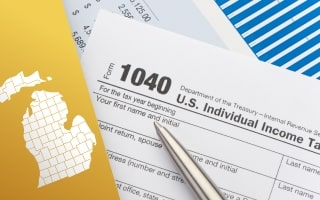Property Tax Records in Michigan

When you purchase a home in Michigan, the county you live in will assess property taxes, which you'll need to pay annually. These taxes are typically used by the county to cover some of the costs in the annual budget, such as public school funding.
Your property taxes are calculated using a countywide tax rate. While tax rates differ in each county, the average rate in Michigan is 1.64%. Only a few counties have tax rates below 1%, and they are mostly smaller, rural counties.
Homeowners receive some protection in how much their taxes can increase each year. The state constitution mentions that the value of a property can't increase by more than 5% each year. Even if the property values in your area are climbing rapidly, the taxable value of your home won't.
Your taxes depend on two factors, which include the tax rate in your county and the value of your home. You should receive your property tax bill in early July. In most cases, these bills must be paid by September 14.
The General Property Tax Act was passed by the State of Michigan in 1893. Since then, property taxes have been the primary revenue source for county governments. In 1995, tax laws were changed slightly to cap a home's assessed value at 50%.
Property Tax Assessment in Michigan

If you own a home in Michigan, your taxes are based on your property's assessed value and market value. In Michigan, your home's assessed value will be 50% of its market value. If the county assessor states that your home is worth $300,000, its assessed value will be $150,000. The property taxes you pay each year are based on the $150,000 amount.
Since Michigan places a 5% limit on how much a property's taxable value can increase every year, the amount that your property taxes are based on could eventually be lower than the assessed value. You may be able to reduce your property taxes by requesting an exemption, deduction, or credit.
In Michigan, the state government assesses a tax of six mills. These mills are added to the rates that have been put in place by county tax authorities, which include the school district. A single mill in Michigan is the same as $1 for every $1,000 of your home's taxable value. Let's say that the mill rate in your county is 20. If your home has a taxable value of $150,000, you'll owe $3,000 in property taxes. The tax rates for the most populous counties in Michigan are:
- Wayne County: 2.16%
- Oakland County: 1.58%
- Macomb County: 1.76%
- Kent County: 1.50%
- Genesee County: 1.89%
Whether you're looking at real estate taxes in Wayne County or even Kent County, property taxes in Michigan are much higher than the national average.
Calculate Michigan Taxes
Smart homeowners and real estate investors use a Michigan property tax calculator to better understand how property taxes are calculated in the state. This tool makes the process easier by allowing users to input key property details, such as location, taxable value, and property classification, to estimate their annual tax assessment and liability based on local millage rates.
A Michigan property tax calculator can also help determine eligibility for available exemptions and tax relief programs. In Michigan, property taxes are based on the taxable value, which is capped by the Proposal A limit, restricting annual increases to 5% or the rate of inflation, whichever is lower, until the property is sold. Common exemptions include the Principal Residence Exemption (PRE), which exempts owner-occupied homes from the school operating tax, and additional relief for disabled veterans, seniors, and low-income households through programs like the Homestead Property Tax Credit.
using our property tax calculator.
Michigan Property Tax Records: What Are They?

For most counties in Michigan, the property taxes that are collected by assessors can be used to pay for a wide range of different public services and budget items. In places like Wayne County, property tax dollars go to local cities and townships as well as school systems. Some of the money will also go to the county government.
If you want to learn more about a home that you wish to buy or invest in, you can look up property tax records, which can be accessed from your county government's website. The tax records that are available on county websites aren't as comprehensive as they are in other states.
Once you input a property address or parcel ID, you'll receive some specific property and tax information. You can use this information to estimate how much property taxes you might need to pay if you purchase the property. The types of information that are available in these records include the following:
-
Municipality
-
Property type
-
Parcel ID
-
Property address
-
Taxpayer
-
Amount of taxes that are owed
-
Tax year
-
Interest and fees
-
Status of taxes, which could be anything from paid to delinquent
You can also use this website to pay your property taxes.
Property Tax Exemptions and Deductions in Michigan

While your home's assessed value might be higher than you'd like, you can reduce it, as well as your property taxes, by claiming one of several exemptions and deductions that Michigan offers to homeowners. Michigan provides nearly two dozen different types of Michigan property tax exemptions, a small number of which can be applied to real estate. Here's a closer look at some of the exemptions that you might qualify for.
Homestead Property Tax Exemption: The Homestead Property Tax Exemption is designed to help property owners reduce their taxes. If you meet the requirements, you'll need to file the Michigan Homestead Property Tax Credit Claim.
The amount of credit you receive is based on a comparison between your household resources and your property taxes. To qualify for this exemption, you must own a home and live in it during the year. You're only allowed to have a single homestead. Vacation homes, cottages, and college dorms don't apply. The other qualifications you must meet include the following:
- Annual household resources must be $67,300 or less
- Resources can't solely consist of payments that the Michigan Department of Health and Human Services provides
- You must live in the home for a period of at least six out of the 12 months during the year
Depending on your annual income, you can use this credit to reduce your property taxes by up to $1,700.
Disabled Veterans Exemption: This exemption is designed to cover all of the property taxes that disabled veterans owe. However, the qualification requirements are strict. To qualify, you must have a permanent and total disability that resulted from your military service. You'll also need to provide a certification from the Department of Veterans Affairs that states you are receiving veterans' benefits.
If you apply for this exemption, you must be considered unemployable because of your disability. You'll need to own and live in a Michigan home for at least six months of the year to be approved for this exemption. If you only live there for nine months, the exemption will be prorated to cover 75% of the property taxes you owe.
Homestead Property Tax Exemption for Senior Citizens: Senior citizens who are at least 65 years old can claim a homestead tax credit that covers as much as 100% of the property taxes that exceed 3.5% of their annual income. The credit can be as high as $1,200.
How To Search Property Tax Records in Michigan

There are a couple of methods you can use to find property tax records in Michigan. For example, you can enter the online database for the county the property is located in. Each county in Michigan provides the public with a database that makes it easy to search for tax records. Let's say you're looking to buy a home in Wayne County. You can search for the property's tax records by entering the address or parcel ID.
As mentioned previously, the main issue with the property tax records in Michigan is that they provide incomplete data. While you'll be able to view the latest tax info, you won't get many details about the property itself. If you're researching a property you're interested in buying, you can gain access to more complete information with a third-party tool like PropertyChecker.
If you decide to use PropertyChecker, you can search deed and property records by entering the owner's name, property address, parcel ID, or phone number. After inputting this information, you'll receive a considerable amount of data, which includes the following:
-
Sales history
-
Names of property owners
-
Loan records
-
Deeds
-
Resident profiles
-
Property details
-
Tax records
-
Property Values
-
Neighborhood details, such as proximity to parks
-
Building permits
-
Lien records
-
Comprehensive foreclosure records
How To Appeal Property Tax Records in Michigan

Property taxes in Michigan are higher than they are in most of the country, which is why you must know how to appeal if you believe the assessed value of your property is higher than it should be. If you successfully appeal the value of your home to have it reduced, you may be able to further lower your property taxes by claiming an exemption. Fortunately, property tax appeals in Michigan are an easy and quick process.
Step 1: The first thing you should do is review the assessment notice you receive. Look for any errors that might explain the discrepancy between this year's assessment and the amount from last year.
Some of the details you should check include acreage, number of rooms, and square footage. If the assessor mistakenly determined that your home had four bedrooms instead of three, the value of your property could increase significantly. If you detect an error, it may be worth it to appeal your home's assessed value.
Step 2: Once you receive your Notice of Assessment, call your local assessor. Their contact information should be listed on the notice. Keep in mind that assessors can fix basic mistakes without needing to schedule a review.
Step 3: If the mistake or error isn't corrected, you can appeal directly to the Board of Review. The acceptable meeting dates for Board of Review appeals are also shown on assessment notices. Dial the contact number on the form to verify that the date is accurate.
When you attend a Board of Review hearing, you must present evidence that supports your appeal, which includes a list of comparable properties in your area and their market values. You'll also need to explain why the comps are accurate.
Step 4: The Board of Review's decision should be sent to you a few weeks after the hearing. If you still don't receive a favorable outcome, you can file your appeal with the Michigan Tax Tribunal. Make sure you submit a Small Claims appeal.
How Property Tax Records Impact Real Estate Transactions in Michigan

When you choose to buy or sell a home in Michigan, property tax records will likely factor into the transaction. Since Michigan property taxes are higher than the national average, buyers, sellers, and investors often consider them.
For example, let's say that you're buying a $300,000 home with a $50,000 down payment. You'll likely pay your property taxes in your monthly mortgage payments. With a 30-year mortgage and an interest rate of 6.6%, your monthly payment, based entirely on the loan's principal and interest, will be $1,600. However, if you live in Wayne County, you may need to add another $300-$400 per month in property taxes alone. This can make a big difference when you're estimating how much you can afford.
For an investor, property taxes can be the difference between a profitable investment and one that never produces positive cash flow. To earn income from a rental investment, the person who buys the property must collect enough rent to cover all their monthly expenses. High property taxes increase monthly costs, which can make it more difficult to generate profits.
Investors in Michigan might also be interested in purchasing tax deeds that are related to unpaid property taxes. In most states, the government can place a tax lien on a home when property taxes go unpaid for a few years. Investors can buy these liens and collect interest payments from the homeowners. Tax sales in Michigan work differently. Investors can buy delinquent real estate outright at an affordable price.
This process occurs over three years. Properties are effectively forfeited to local treasurers once taxes go unpaid for two years. During the third year of delinquency, the properties are foreclosed on, which means that investors can buy them at public auctions. Keep in mind that the original property owner will likely have six months to a year to repay their property taxes and any interest, even after you buy the home. All Michigan tax sales are hosted by Tax-Sale.info.
Free Michigan Property Tax Lookup
Tax Records Please wait...
Property Tax Guide
- Property Tax Records in Michigan
- Property Tax Assessment in Michigan
- Michigan Property Tax Records: What Are They?
- Property Tax Exemptions and Deductions in Michigan
- How To Search Property Tax Records in Michigan
- How To Appeal Property Tax Records in Michigan
- How Property Tax Records Impact Real Estate Transactions in Michigan
Instant Access to Michigan Property Records
- Owner(s)
- Deed Records
- Loans & Liens
- Values
- Taxes
- Building Permits
- Purchase History
- Property Details
- And More!
Free Michigan Property Tax Lookup
Tax Records Please wait...
Property Tax Guide
- Property Tax Records in Michigan
- Property Tax Assessment in Michigan
- Michigan Property Tax Records: What Are They?
- Property Tax Exemptions and Deductions in Michigan
- How To Search Property Tax Records in Michigan
- How To Appeal Property Tax Records in Michigan
- How Property Tax Records Impact Real Estate Transactions in Michigan